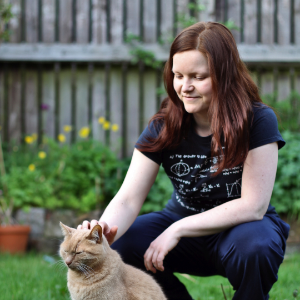
It's only been a couple of months since I finally started my own Instagram page, full of funny maths memes and some other maths scribbles, tricks, and so on.
I very much appreciate the enormous interest in my Insta page, and I'm very grateful for every single follower I have there. It shows me that so many of you find maths interesting or funny or just like to interact with maths in your free time – that's absolutely fabulous!
On the other hand, the huge interest in my Instagram activities started bringing way too many peculiar messages. And I just can't keep answering every single time one lands in my inbox.
So, I've decided to give you a brief guide on the most common questions and my likely answers to them. If you've got to this page through a link I sent you in a message, please read through, as your answer is somewhere here =)
This saves me time so I can do more maths stuff, as I'm a busy bee – and I'm sure you all appreciate it more than if I were buried under a ton of messages, answering repeatedly to every single one.
Let's get to the list then:
- "Hi" (nothing more) Well, hi to you back =)
- [throws some random maths question] I'm not WolframAlpha to spit out a calculation as you wish. Starting with "Hi, may I please ask you..." is more likely to get you an answer from me.
- "Hi, may I ask you a question?" Sure, just ask; you don't need my permission. However, bear in mind that there are types of questions that have a universal answer – see some common examples below.
- "Hi, can you help me with [throws some random maths question]" Most likely I can, but most likely I won't do it for free (apparently, that's what a lot of people on Instagram expect). Please send me an email with your maths enquiries so we can discuss further how I can help you.
- "What's your name?" (This used to be a bit of a struggle before I rebranded.) You should know my name by now if you've read this article from the beginning. Also, a good hint is the email address that I have out there as my preferred way of communication about maths inquiries. And my actual brand name, after I've changed it.
- "Where are you from?" This is quite irrelevant. What matters possibly more is what curriculum I'm used to teaching. It's the English and Scottish national curricula I teach most of the time, as I live in the UK.
- "Can you post this meme?" [sends random meme] If I like it and it's maths-related or at least education-related, I may post it. I don't post all memes, even if I may like them, if I don't feel that they would be a good fit for my page.
- [asks a silly question] Think again about whether you really need to know my age, my relationship status, what I had for dinner, and if I ever cry. If you really need to know, then I'm sorry, but you'll have to live without the answer.
- "Can we be friends?" I'm default-friendly with everyone. However, I don't see a reason to become friends with a random person on the internet whom I don't know at all. Do you?
- [keeps throwing random questions and messages unrelated to maths, education, or anything relevant that makes sense] I'm sorry, try to read this guide again.
So, this is what I need to deal with from time to time, and I just can't keep up. As I said, I'm very grateful for every single one of you who appreciates what I do, and I do like to interact with all of you – but please, let's keep it relevant, professional, and reasonable =)


